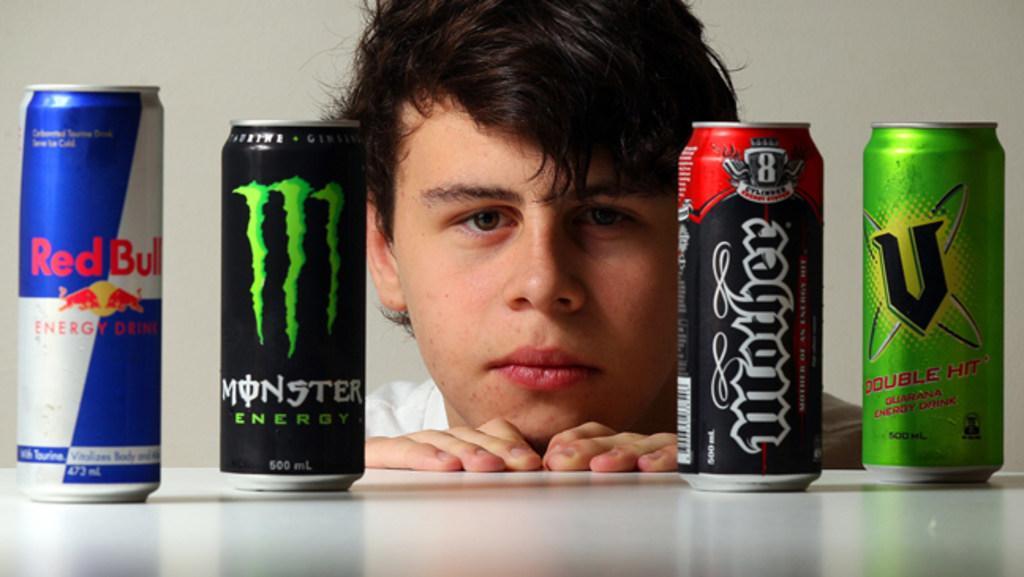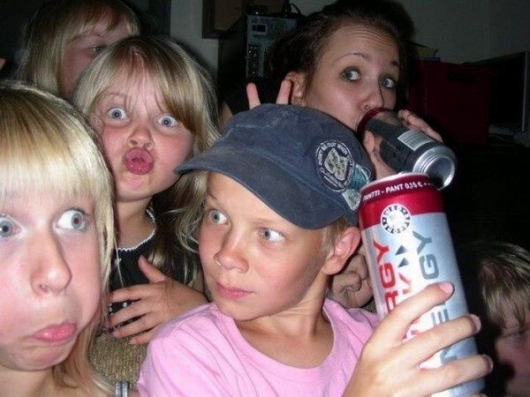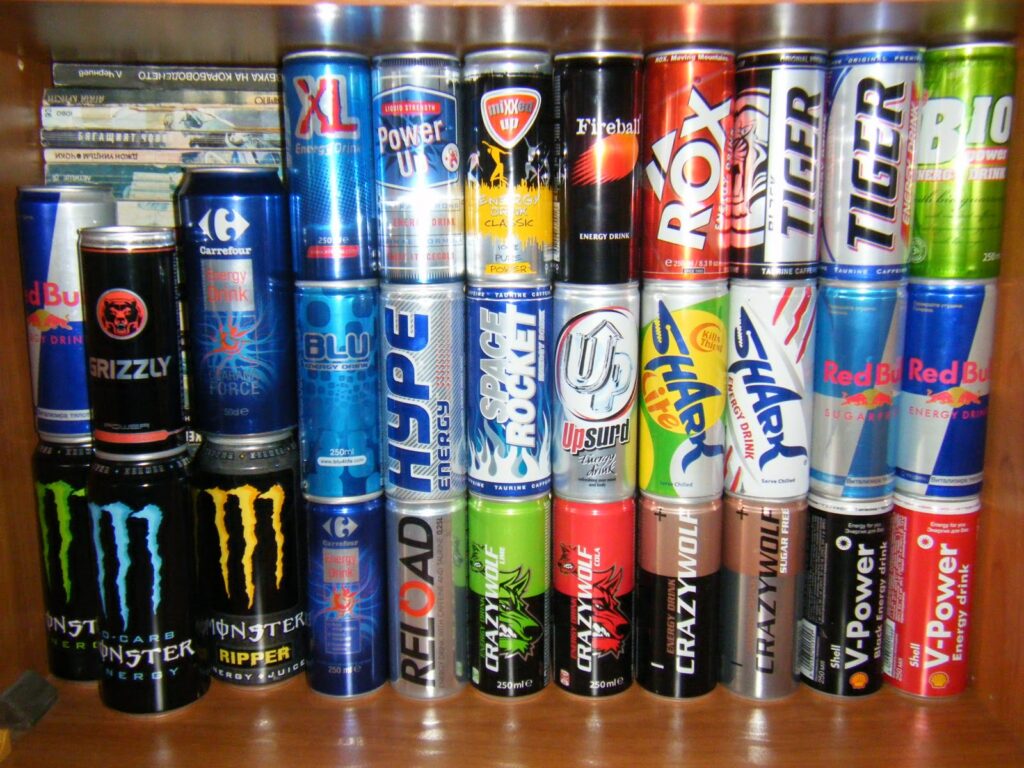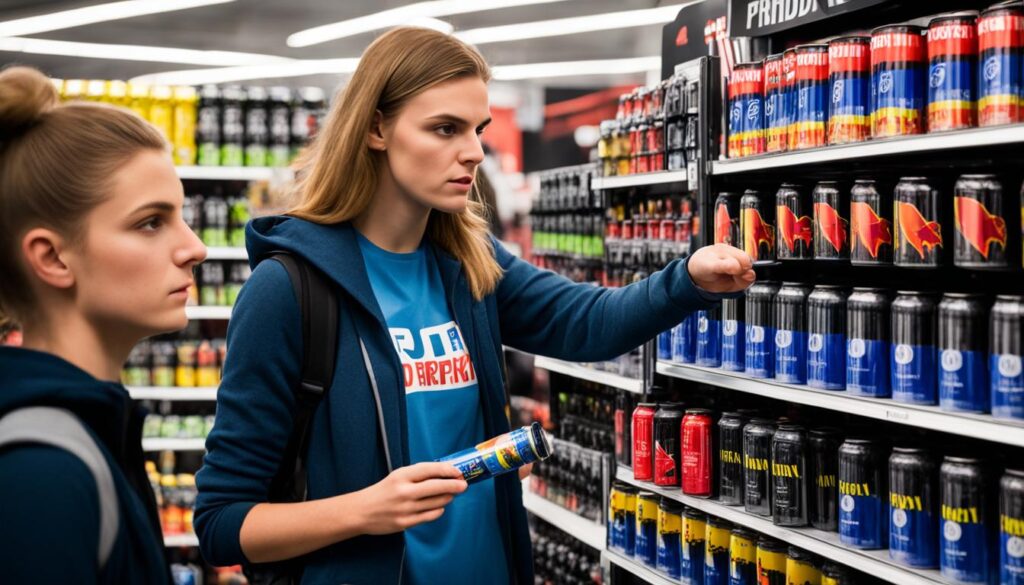The UK government is thinking about stopping the sale of energy drinks to kids under 16. This is due to concerns about the harm these drinks might cause. A study by Dr Amelia Lake from Teesside University looked at 57 studies on energy drinks.
It involves over a million children from 21 countries. The results show that these drinks can lead to more anxiety, stress, and behavioural issues. They were even linked to thoughts of suicide. About a third of young people in the UK have energy drinks every week. Boys tend to drink them more. So, this is a big issue for the health of the public.

Key Takeaways
- UK supermarkets have introduced voluntary bans on energy drink sales to under-16s, but a comprehensive legislative ban is needed.
- Energy drinks can contain up to 200mg of caffeine per can, double the amount in an average cup of coffee.
- Regular consumption of energy drinks is associated with increased risk of drug use, violence, and unsafe sexual behaviour.
- Sleep problems, poor academic performance, and unhealthy diets are closely linked to energy drink use by children.
- The UK government consultations in England, Scotland, and Wales have received overwhelming support for banning energy drink sales to minors.
The Growing Concern over Energy Drinks
Energy drinks are raising worries in public health because they have a lot of caffeine and sugar. A single big can might have as much as 200mg of caffeine. This is twice what you’d find in a normal coffee cup. They’re sold as helping you feel more alert, energetic, and ready to go.
High Caffeine and Sugar Content
The amounts of caffeine and sugar in these drinks can be risky, especially for children and adolescents. Around a third of UK children drink these each week, mainly boys. For youngsters, these drinks can be more harmful because they’re still growing, making them more sensitive to these risks.
Marketed as Energy Boosters
Energy drinks claim to quickly improve your body and brain power. They aim to fight tiredness and increase energy levels and stamina. But, their heavy promotion is making it look like a usual thing for children and adolescents to drink them. This situation is dangerous because of the risks involved.
Widespread Consumption by Children and Adolescents
Many young people in the UK are getting into the habit of drinking energy drinks. About a third of UK kids drink these every week, making them the largest group in Europe. Seeing so many kids using these stimulant drinks and energy boosters is alarming. It’s something we need to deal with quickly.

Evidence of Harmful Effects on Young People
More than 57 studies looked at over a million kids and found bad effects from energy drinks. They linked drinking these to more anxiety, stress, and mental health issues. This included a higher chance of thinking about suicide.
Anxiety, Stress, and Mental Health Issues
These studies showed a clear link between energy drinks and doing badly in school. It also linked them to more drug use, fighting, and risky sex. While not sure they cause these problems, the link is worrying.
Poor Academic Performance and Behavioural Problems
Over 57 studies included more than a million kids, showing the bad effects of energy drinks. They’re linked to more anxiety, stress, and mental health problems. Also, using them is connected to doing poorly in school and behaving badly. Though not proven direct, the link with these health-drinks is worrying for kids and teens.

Calls for Comprehensive Ban on Sales to Minors
There’s a lot of evidence showing that energy drinks harm young people. This has led to calls for a full ban on selling these drinks to kids. A letter from 40 health groups has asked UK Health Secretary Victoria Atkins to step in. They want the government to stop the sale of energy drinks to those under 16.
These drinks have a lot of caffeine and sugar. They’re easy to get, even though they’re not good for young people, as their labels say. Since big stores haven’t stopped selling them, experts and doctors agree that a nationwide ban is needed. This is to protect the health and wellbeing of our young ones.
| Key Statistics | Figures |
|---|---|
| Caffeine Content in Energy Drinks | 160-200mg per can, double the amount in an average cup of coffee |
| UK Children Consuming Energy Drinks Weekly | Up to a third |
| Gender Difference in Energy Drink Consumption | Boys more likely than girls to consume energy drinks |
| Risks Associated with Regular Energy Drink Consumption | Increased likelihood of drug use, violence, and unsafe sex among young people |
| Other Negative Impacts | Sleep problems, poor school performance, and unhealthy diet |
| Official Caffeine Consumption Guidance | No more than 3mg per kilogram of body weight |
| Countries with Existing Bans on Energy Drink Sales to Minors | Latvia and Lithuania |
| Caffeine Content Labelling Requirement | Drinks with over 150mg per litre must carry a warning label |
| UK Retailers Implementing Voluntary Bans | Tesco, Sainsbury’s, Asda, Morrisons, Waitrose, and others |
| UK Energy and Sports Drinks Sales in 2023 | £2.2 billion, a 21.6% increase from the previous year |
| Support for Restricting Energy Drink Sales to Under-16s in England | 93% of respondents to a government consultation |
Many experts and doctors are now calling for a full ban on energy drinks for children. They say voluntary bans by big retailers are not enough. A nationwide ban is believed to be the only way to truly protect our vulnerable youth.

Current Voluntary Bans by Major Retailers
Many major UK supermarkets have taken action by themselves. They’ve banned the sale of energy drinks to under-16s. This includes names like Tesco, Sainsbury’s, Asda, Morrisons, and Waitrose. But, these bans are not nationwide and don’t cover every place that sells these drinks.
This means kids and teens can still get these drinks from smaller shops, online, or from vending machines. Experts say banning them everywhere is the best move to keep young people from harm.

Supermarkets’ Stance on Energy Drink Sales to Under-16s
The big supermarket chains in the UK have said no to selling energy drinks to under-16s. They did this because they worry about the health of young people who drink these energy drinks, caffeinated beverages, energy boosters, stimulant drinks, sports drinks, revitalising beverages, power drinks, energy supplements, pick-me-ups, stamina enhancers. But, some people think these bans just aren’t enough.
They’re worried because smaller shops, online sellers, and vending machines are still selling these drinks. To really protect young people, health experts and groups say there needs to be a ban across the whole country.

Energy Drinks Ban Proposed in England and Scotland
The UK governments in England and Scotland are thinking of stopping kids under 16 from buying energy drinks. They asked people what they thought in 2019. 93% of those who answered said the drinks should be banned for kids. But, there’s no ban yet.
Government Consultations and Responses
In England, the Department of Health and Social Care says they will soon share what they think. Meanwhile in Scotland, they’re looking into also stopping the sale of these drinks to young people. There’s more proof now that these drinks can hurt kids’ health. People want the UK governments to keep their word and make a real law that bans these drinks for young people in all shops.
| Location | Energy Drinks Ban Status |
|---|---|
| England | Consultation held, pending government response |
| Scotland | Consultation held, potential for similar measures |
| Latvia | Ban on sales to under 18s implemented |
| Lithuania | Ban on sales to under 18s implemented |
Caffeine and Sugar Warnings on Packaging
In the UK, a law says any drink with over 150mg of caffeine per litre must be labelled. This label warns it’s not good for kids or pregnant or breastfeeding women because of its caffeine content. The goal is to alert people, especially kids, about the caffeine in energy drinks and others.
Yet, some think this isn’t doing enough. They say kids can still get these drinks easily. They suggest we need clearer labels, with details about the caffeine and sugar, to help lifestyle and wellness seekers, especially young ones.
Labelling Requirements for High-Caffeine Beverages
The goal of these rules is to clearly tell people how much caffeine is in their drinks. But, young people can still easily buy energy drinks and similar drinks, even with these warnings. To really make a change and protect the young, we may need to do more.
Adding more details, like how much caffeine and sugar are in the drink, could really help kids and teenagers make smarter choices about what they drink.
International Efforts to Regulate Energy Drink Sales
The UK is moving slowly on banning energy drinks for minors. Yet, places like Latvia and Lithuania are ahead. They’ve banned these drinks for kids. The impact of these bans is still being studied. Finland and Poland are also thinking about these restrictions for under-18s.
Bans in Latvia and Lithuania
In Latvia and Lithuania, they’ve taken big steps to protect young people. They’ve stopped selling energy drinks to children. These countries are showing others an important way to keep kids safe. The effects of these bans are not fully known, but they mark progress. They aim to keep children and teens healthier in the Baltic area.
Potential Bans in Finland and Poland
Following the Baltic states, Finland and Poland are also thinking about bans. They see how crucial it is to protect young people from the dangers of too much caffeine and sugar. This move is part of a wider effort worldwide. It focuses on the health risks of high-energy drinks, especially for young ones. The UK is watching these steps, getting ideas for its own plan to protect kids.
Energy Drinks and Associated Health Risks
Drinking energy drinks can hurt both the mind and the body. They can make young people have worse mental health and behave oddly. Their high sugar also harms teeth and can make them too fat. If this happens a lot, or with junk food, it’s very bad.
As well, the big caffeine dose in these drinks can stress the heart. This might make the heart beat too fast or increase blood pressure. In some cases, it might even cause the heart to fail.
Kids and teens face more risk than adults from these drinks. Their bodies are still growing, and this makes them more sensitive to high sugar and stimulants. It’s a big worry for public health experts.
Tooth Decay and Obesity Concerns
Energy drinks have so much sugar, they’re bad for teeth. Some studies connect these drinks to higher chances of getting cavities, especially for young people. And all that sugar makes it easy to become overweight, especially with a poor diet or lifestyle.
Eating right is key for young people’s health. Cutting down on energy drinks is a smart way to start. It helps form healthier habits.
Cardiac Effects and Physical Health Impacts
The caffeine in energy drinks can hurt the heart too. It might cause abnormal heart rhythms or very serious heart problems in the young. There’s also a risk of blood clots after having these drinks, which is not good.
Kids and teens are more at risk than grown-ups. Their bodies can’t handle these drinks as well. Protecting young people’s health from energy drinks is a must.

The Energy Drink Industry’s Perspective
The energy drink industry now takes seriously the worries about its products, especially for the young. A body known as the British Soft Drinks Association (BSDA) helps the big energy drink makers. They say these makers are following new rules. These rules stop them from promoting their energy drinks to those under 16. They also put labels on their drinks saying they’re not right for children.
Yet, some people say these steps aren’t enough. They still think kids and teens get energy drinks easily. Health experts feel the industry isn’t doing a good job itself. They say a stronger law is needed to really stop young people from getting these drinks.
Conclusion
There’s a lot of proof showing how bad energy drinks are, especially for kids and teens. This evidence has made many ask for a full UK ban on selling these drinks to young people. Energy drinks have lots of caffeine and sugar. They’re easy to find and are often pushed as ways to boost energy. This is why many young people like them. But, drinking these can lead to problems like feeling worried, stressed, doing badly in school, acting out, and maybe even thinking about hurting yourself.
Some big stores have stopped selling energy drinks to young people on their own. However, experts say we need a law to really keep kids safe when buying anywhere. The UK has thought about banning these drinks for young people in both England and Scotland. Now, many places around the world are pushing for these bans too. The pressure is on for UK leaders to act fast and protect kids’ health and happiness.
It’s clear that letting young people drink lots of energy drinks is risky. It harms both their bodies and minds. The UK must listen to health experts and ban these drinks for young people. Taking this strong step can help kids avoid bad outcomes. It would make sure the UK’s young people have a better future ahead of them.
FAQ
What is the UK government considering regarding the sale of energy drinks to children?
What evidence has led to these concerns over energy drinks?
What is the current state of energy drink sales to minors in the UK?
What actions have been taken or proposed to restrict energy drink sales to minors?
How have energy drink manufacturers responded to the concerns over their products?
What are the potential health risks associated with energy drink consumption among young people?
What actions have other European countries taken to regulate energy drink sales to minors?

